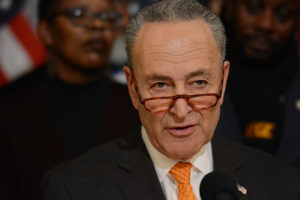The Senate on Wednesday began considering the fiscal year 2024 National Defense Authorization Act, with the upper chamber’s majority leader looking to complete work on the bill by the end of the month.
“If both sides keep working together, I hope we can finish passing the defense authorization bill before August. And I think most of us would like to see that happen. There’s no justification for letting it spill into the fall. We have a lot of work to do before we get there but we’re on track to get it done,” Majority Leader Chuck Schumer (D-N.Y.) said on the Senate floor.

The Senate Armed Services Committee previously advanced the $886 billion version of the NDAA out of committee in June (Defense Daily, June 23).
After locking in an amendment package to consider 51 total amendments to the NDAA, including 21 from Democrats, 21 from Republicans and nine bipartisan proposals, the Senate voted on four proposals Wednesday evening.
“And I hope there’ll be a second Manager’s package with even more priorities for both sides,” Schumer said.
As of Defense Daily’s deadline, the Senate had voted 96-2 in favor of an amendment from Sen. Patty Murray (D-Wash.) to expand beryllium tests for Department of Energy employees under the Occupational Illness Compensation program and 65-28 to approve a measure from Sen. Tim Kaine (D-Va.) on prohibiting the president from withdrawing from NATO without two-thirds of support from the Senate.
The Senate voted 16-83 against adopting an amendment from Sen. Rand Paul (R-Ky.) clarifying that Article 5 of the NATO treaty “does not supersede the constitutional requirement that Congress declare war before the United States engages in war.”
The final amendment to be considered on Wednesday is a measure from Sens. Josh Hawley (R-Mo.) and J.D. Vance (R-Ohio) clarifying the “aggregate value” associated with assistance provided to international partners via presidential drawdown authority.
Floor consideration will pick up again on Thursday morning with an amendment from Sens. Ted Crux (R-Texas) and Joe Manchin (D-W.Va.) banning the sale of petroleum products from the Strategic Petroleum Reserve to entities in China, Russia, North Korea and Iran, before moving onto other proposals offered to the NDAA.
“We’ll begin voting this afternoon and we want this process to be open and fair without being dilatory. We want both sides to have input, but neither side should derail the bill. We should avoid the chaos we saw last week in the House that greatly hindered their NDAA process. So far, we’ve avoided that. The process in the Senate has been constructive and moved along at a good pace,” Schumer said.
Schumer referenced the House’s more contentious NDAA debate over many GOP-led amendments, adding the process in the lower chamber was “delayed and at times derailed by wildly partisan and irrelevant hard-right amendments that have nothing to do with defense.”
The House narrowly passed its own $886 billion version of the NDAA last week with a 219-210 vote, which followed days of debate over Republican proposals that included reversing Pentagon policies on abortion and diversity programs (Defense Daily, July 14).
Democrat leaders on the House Armed Services Committee, including Ranking Member Adam Smith (D-Wash.), ahead of the final vote announced they would oppose the typically bipartisan legislation that they said was now “an ode to bigotry and ignorance.”
After the Senate passes its own NDAA, the two chambers will meet to conference out differences between the two bills and settle on a final version of the legislation.